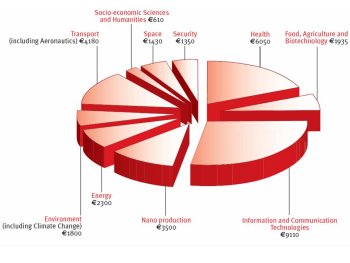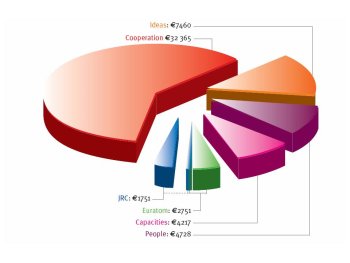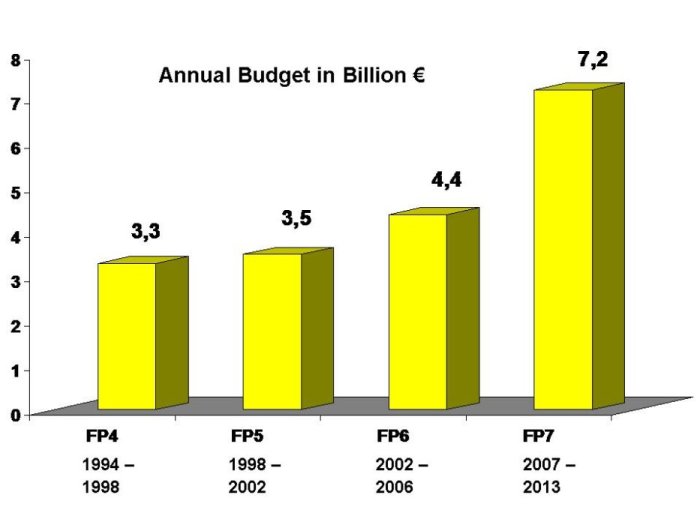Structure: Specific Programmes
FP7 will aim to build on the accomplishments of the previous research framework programme, and will be implemented through four specific programmes. The 'Cooperation' programme will support research cooperation in a number of key thematic areas:
- Health
- Food, Agriculture and Biotechnology (aiming to build a European "knowledge based bio-economy" to meet demand for safer and healthier food and sustainable use and production of renewable bio-resources)
- Information and Communication Technologies
- Nanosciences, Nanotechnologies, Materials and new Production Technologies
- Energy
- Environment (including climate change)
- Transport (including Aeronautics)
- Socio-economic sciences and Humanities
- Security
- Space
'Ideas' will fund investigator-driven research through a newly created European Research Council (http://erc.europa.eu/index_en.cfm). With the creation of a European Research Council (ERC), the European Union is taking a major step towards the realisation of a European Research Area by supporting scientific research in Europe. The ERC will be the first pan-European funding agency for frontier research. Early stage as well as fully established investigators from across Europe will be able to compete for ERC grants with scientific excellence as the sole criterion for funding. The Scientific Council will direct the ERC’s scientific operations and ensure that its support is in accordance with the highest standards of science and scholarship.
The 'People' programme will support training and researchers' career development:
- Initial training of researchers - Marie Curie Networks
- Life-long training and career development - Individual fellowships
- Industry-academia pathways and partnerships
- International dimension - outgoing and incoming fellowships, international cooperation scheme, reintegration grants
- Excellence Awards
'Capacities' will fund the coordination and development of research infrastructure, regional research clusters, international cooperation and closer ties between science and society:
- Research infrastructures
- Research for the benefit of SMEs (The aim is to strengthen the ‘innovation capacity’ of small and medium-sized enterprises (SMEs). The core of this action focus in SMEs or SME associations in need of outsourcing research to providers of research services (‘RTD performers’) such as universities, research centres or other, more specialised SMEs)
- Regions of Knowledge
- Science in Society
- Support to the coherent development of research policies
- Specific activities of international cooperation
Research Potential
For more information please visit: http://cordis.europa.eu/fp7/budget_en.html
Introduction
The 7th Framework Programme (FP 7) for research and technological development is the EU's main instrument for funding research in Europe and it will run from 2007 to 2013. It cleared its final hurdle on 18 December 2006 when it was adopted by the Council. The Programme started on 1 January 2007. With a total budget of €50.521 billion, FP7 will run for of seven years. It represents a 41% budget increase from FP6 at 2004 prices (Source European Commission:
http://cordis.europa.eu/fetch?CALLER=FP7_NEWS&ACTION=D&RCN=26875
Under FP7, the highest portion of the budget will go to information and communication technologies (€9.11 billion), followed by health (€6.05 billion), transport (€4.18 billion) and nanotechnology (€3.5 billion), energy (€2.3 billion), and food, agriculture and biotechnology (€1.935 billion). Other budget lines include environmental research (€1.8 billion), space (€1.43 billion), security (€1.35 billion), and social-economic sciences and humanities (€610 million).
FP 7 is designed to build on the achievements of its predecessor towards the creation of the European Research Area (ERA), and carry it further towards the development of the knowledge economy and society in Europe.
Research and technology development work is generally funded 50 percent of the partner's costs. However, up to 75 percent of funding is available to small and medium-sized enterprises, universities and government facilities. Training and Management Activities are funded 100 percent as in FP6.
For more information please visit: http://cordis.europa.eu/fp7/understand_en.html
Creating an R&D Project
Planning and developing an R&D project proposal requires several aspects to be taken into account. Below is a non-exhaustive, non-prescriptive list to be considered:
- Identification of research areas in the R&D workprogramme that are aligned with the competencies, areas of activity and mid- to long-term strategic goals of your organisation. Take care to note the anticipated periods when calls for proposals in your area(s) of interests are scheduled to be launched.
- Confirm that the funding mechanisms available are appropriate for your goals.
- Identify other organisations that are complementary in terms of skills and perspective for achieving the research ideas under consideration.
- Build a quality international consortium that:
- Meets the minimum participation rules for the specific call for proposals you are targeting. These will be detailed in formal documents associated with each call and published by the relevant Commission service;
- Has a mix of different types of organisations (e.g. academic, user organisations, industrial companies, SMEs, etc.) appropriate for advancing the goals of the proposed project;
- Has the right mix of competencies and track record to carry out and manage the proposed research.
- Familiarise the consortium with specific guidance documentation and templates published by the Commission for the targeted call for proposals.
- Draft a comprehensive proposal document that adheres to the guidelines published by the relevant Commission service.
- Submit the proposal to the European Commission in line with the deadline indicated for the targeted call for proposals.
There are numerous other aspects and ways to approach the creation of a project proposal, which will vary depending on many factors, such as the research area targeted, the type of organisation, the size of the organisation, the number of partners in a consortium, the type of research project proposed. The National Contact Points (NCPs) (LINK) can provide comprehensive guidance for the specific and unique circumstances for your consortium or organisation.
Specific projects for SMEs
The Specific projects for SMEs were previously available under FP5 as SME Specific Measures.
| Ținte și Obiective: |
Their main purpose is to promote the participation of SMEs. |
| Componentele proiectului: |
There are two main parts to this instruments:
|
| Further information: |
Specific Support Actions
The Specific Support Actions are a continuation of the Accompanying Measures available in FP5.
| Ținte și Obiective: |
Their main purposes is:
|
| Componentele proiectului: |
The projects within the priority themes may cover the following for example:
or a combination of these as appropriate. |
| Type of funding: |
Grant to the budget up to 100% |






